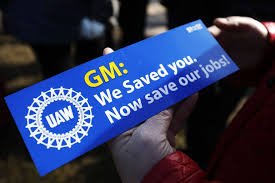
INDIANA – Negotiations between the United Auto Workers (UAW) labor union and the Big Three automakers, including General Motors, are ongoing ahead of the expiration of the current labor contracts next month.
The union’s contracts with the automakers are set to expire at 11:59 p.m. on Sept. 14.
The United Auto Workers (UAW) union is preparing to up the ante in its contract negotiations with the “Big Three” automakers – Ford, GM, and Stellantis – and will vote next week on authorizing strikes against the Detroit trio.

“Whether or not there’s a strike next month is entirely up to the Big Three automakers,” said UAW president Shawn Fain in a statement on Facebook Live yesterday.
UAW members include 150,000 auto workers from General Motors, Ford, and Stellantis.
“The Big Three need to get serious, and they need to get down to business,” added Fain.
Fain told local union offices to report the results of their votes by Aug. 24. Voting to authorize strikes is a standard practice during contract negotiations, and grants union leadership the ability to call for a labor stoppage, though it is not guaranteed to happen. Usually, members overwhelmingly vote in favor of strike authorization, an outcome that Fain encouraged during the live stream – “We’re done taking their crap and the scraps they want to feed us.”

President Biden weighed in on the ongoing negotiations in a statement urging both sides to come to an agreement that supports the middle class, while also continuing the auto industry’s transition to “a clean energy future.”
“The UAW helped create the American middle class and as we move forward in this transition to new technologies, the UAW deserves a contract that sustains the middle class,” President Biden’s statement reads.

Recent reports cite an anonymous source indicating that the UAW’s contract demands may result in an extra $80 billion in annual labor costs. The UAW is reportedly seeking a 40-percent pay hike over the course of a four-year contract, including a 20-percent increase upon ratification. The labor union points to 40-percent pay raises for the CEOs at the Big Three automakers as justification for worker pay increases.
GM has criticized the proposal, stating it “would threaten our ability to do what’s right for the long-term benefit of the team. We think it’s important to protect U.S. manufacturing and jobs in an industry that is dominated by non-unionized competition.”



